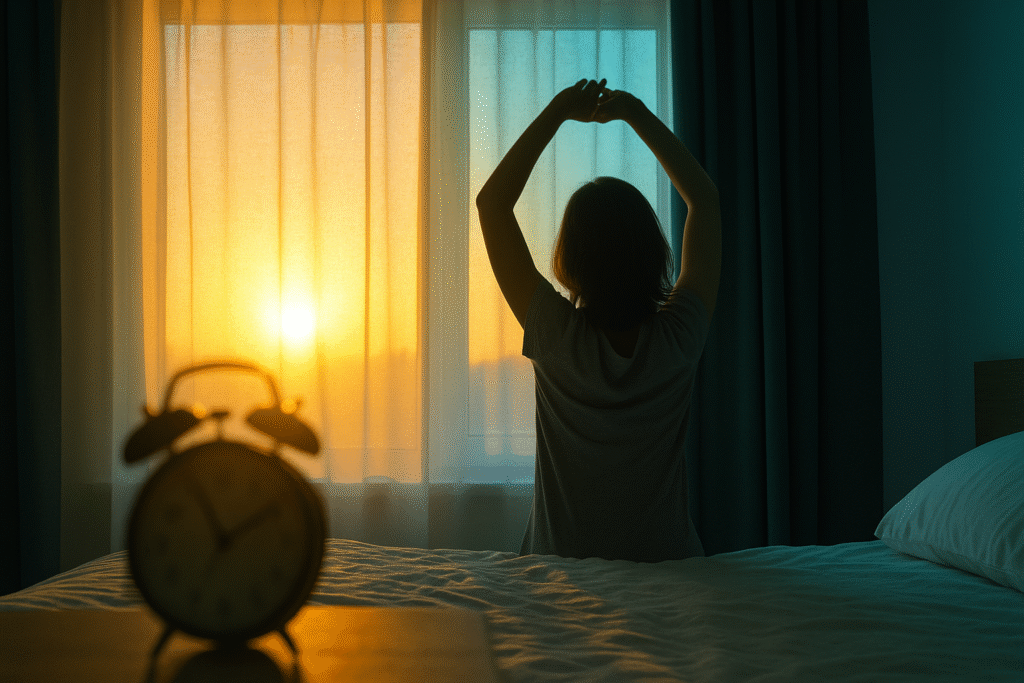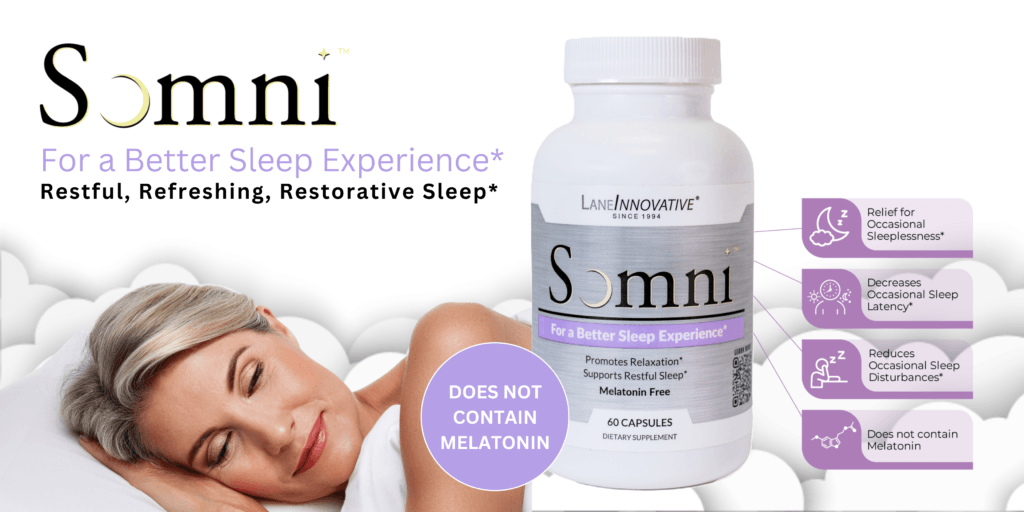Sleep
Melatonin and Sleep Biorhythm: Natural Alternatives Explained
New Concerns About Long-Term Melatonin Use
In light of new findings from the American Heart Association, long-term use of melatonin supplements is under renewed scrutiny.
A recent analysis reported associations between regular melatonin use and higher rates of cardiovascular issues among adults using the hormone nightly to support sleep.
While this doesn’t prove cause and effect, it highlights a growing concern: melatonin may not be as harmless as many assume.
Recent research on melatonin and sleep biorhythm suggests that long-term hormone supplementation may not always support restorative rest.

Melatonin is often promoted as a natural solution for better sleep. However, supplementing with this hormone can sometimes disrupt your body’s internal clock rather than help it.
Let’s explore how melatonin can interfere with your sleep biorhythm — and six natural ingredients that can promote deeper, more restorative sleep without relying on melatonin.
Melatonin and Sleep Biorhythm — Why It Matters
Understanding the connection between melatonin and sleep biorhythm helps explain why too much supplemental melatonin can confuse your body’s natural sleep cycle.
Why Melatonin Can Backfire on Your Sleep Biorhythm
Melatonin plays a key role in signaling to your body that it’s time to wind down.
But the supplemental form — often taken in doses far higher than the body naturally produces — can confuse your biological clock.
Taking melatonin at the wrong time of day or in excessive amounts may lead to daytime grogginess, vivid dreams, or even disrupted sleep cycles.
It’s important to remember that melatonin doesn’t make you sleep; it simply cues your body that it’s nighttime.
For most people with ordinary sleep challenges, melatonin doesn’t address the root causes — such as stress, poor sleep hygiene, or nutrient imbalances.
That’s why many experts now recommend supporting the body’s natural biorhythm instead of overriding it with hormone-based sleep aids.
“Melatonin doesn’t make you sleep — it simply signals that it’s time to rest. If your stress hormones or bedtime habits are out of sync, extra melatonin won’t fix the root cause.”
6 Natural Ingredients That Support Better Sleep — Without Melatonin
These nutrients work with your body’s natural melatonin and sleep biorhythm, helping promote calm, restorative rest.
- Ashwagandha – The Stress-Reducing Adaptogen
Studies suggest that ashwagandha may help promote a sense of calm and improve sleep onset and quality by supporting a balanced stress response.* - L-Theanine – Calm Alertness Without Drowsiness
Found in green tea, L-Theanine is a calming amino acid that helps quiet mental chatter before bed.
It encourages relaxation and smooth transition into rest without causing next-day grogginess.* - Magnesium Bisglycinate – The Relaxation Mineral
Magnesium is essential for over 300 biochemical reactions, including those that regulate the nervous system.
The bisglycinate form is gentle and highly bioavailable, supporting muscle relaxation, calm brain function, and healthy sleep patterns.* - Passion Flower – Traditional Herbal Calm
This time-honored herb supports relaxation by encouraging GABA activity in the brain — helping ease a racing mind for more natural rest.* - Chamomile – The Time-Tested Bedtime Herb
Chamomile contains apigenin, a compound that binds to receptors in the brain to encourage sleepiness naturally.
A warm cup of chamomile tea remains a simple, effective bedtime ritual.* - 5-HTP – Natural Serotonin Support
5-HTP is a precursor to serotonin, the neurotransmitter that helps regulate mood and supports your body’s own melatonin pathway —
without the need to supplement with the hormone directly.*
The body naturally produces just 0.1–0.3 mg of melatonin at night — yet many supplements deliver up to 30 times that amount. Oversupplementing can shift your circadian rhythm and lead to grogginess or vivid dreams.*
You can help your body re-establish its sleep-wake rhythm using simple cues:
- Morning sunlight: 10–15 minutes of natural light within an hour of waking boosts serotonin and sets your internal clock.
- Meal timing: Eating breakfast and dinner at consistent times reinforces circadian rhythm signals.
- Evening dimming: Use warm light after sunset and avoid bright overhead lighting two hours before bed.
These daily “zeitgebers” (time-givers) strengthen the biological rhythm melatonin is meant to regulate naturally.
“True sleep quality depends on the balance of neurotransmitters like GABA and serotonin — not just melatonin levels. Nutrients such as magnesium and L-Theanine help support that balance naturally.”
Sleep isn’t only about melatonin; cortisol timing plays an equal role. When cortisol stays elevated into the evening — from chronic stress, caffeine, or late-night screen exposure — melatonin’s nighttime rise can be blunted. Try calming techniques such as slow breathing, progressive relaxation, or journaling to encourage a healthy cortisol drop and smoother transition to sleep.
30 minutes before bed:
- Power down electronics.
- Brew a non-caffeinated herbal tea (chamomile, lemon balm, or passion flower).
- Dim lights and practice five minutes of mindful breathing.
- Read or listen to calming music instead of scrolling.
- Keep your bedroom between 65–68 °F (18–20 °C) for optimal rest.
Consistency is key — your brain learns these signals and starts producing its own melatonin at the right time.
Beyond Supplements: The Lifestyle Foundation of Restful Sleep
Even the best nutrients can only do so much without consistent habits that reinforce your melatonin and sleep biorhythm naturally. Try reinforcing your sleep routine with these simple strategies:
- 🕰️ Keep a steady sleep schedule. Go to bed and wake up at the same time daily, even on weekends.
- ☀️ Get morning sunlight. Natural light exposure early in the day helps regulate melatonin timing at night.
- 🧘♀️ Wind down before bed. Meditation, light stretching, or journaling can help lower evening cortisol.
- 🥦 Eat sleep-friendly foods. Choose whole foods rich in magnesium, B vitamins, and tryptophan (leafy greens, seeds, eggs, poultry).
- 📵 Reduce blue light. Limit screen exposure 30–60 minutes before bedtime to help your brain prepare for rest.
Conclusion: Restoring Natural Balance
While melatonin can be useful for short-term needs such as jet lag or occasional circadian rhythm shifts, experts caution that long-term daily use may not align with the body’s natural biorhythm.
Supporting your own production of calming neurotransmitters and maintaining consistent sleep habits is often a better long-term strategy.
By focusing on nutrient support, stress reduction, and lifestyle consistency, many people find their sleep quality improves naturally — without the need to supplement with a hormone their body already makes.
References
Like? Share with Your Friends!

